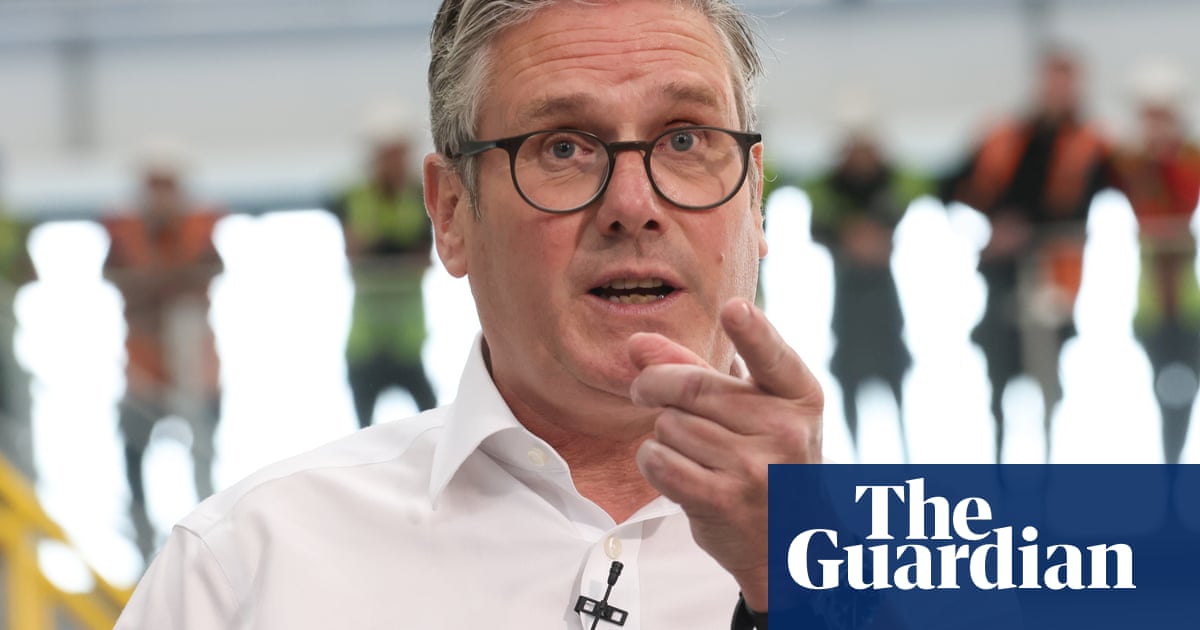The Conservatives are “sliding into the abyss”, Keir Starmer has said, as he describedNigel Farageand Reform as the main challengers to his Labour government.
Making a hastily arranged visit to a glass factory in St Helens, the prime minister castigated Farage as a fake defender of working people and compared him to Liz Truss as someone whose fiscal plans would crash the economy.
In a media Q&A after his speech, Starmer was asked why he was focusing so much attention on Reform, and whether he believed they were the main threat to Labour.
“I do think that the Conservative party has run out of road,” Starmer said. “Their project is faltering. They’re in the decline. They’re sliding into the abyss. It’s very important, therefore, that we say that and identify that.”
“And the choice at the moment is between the choice of a Labour government that thinks stable finances are at the heart of building better lives for working people, or Nigel Farage and Reform, who only this week said they would spend billions upon billions upon billions, tens of billions of pounds, in an unfunded way, which is an exact repeat of what Liz Truss did.”
With recent polls consistently showing Reform ahead in national polling and the Conservatives a distant third – orin one case fourth– Starmer used Thursday’s event in Merseyside as a direct riposte to Farage’sevent in London on Tuesday, in which the Reform leader tried to argue his was the party of the working classes.
However, much of Farage’s focus was on tax and spend plans that thinktanks have said could cost many tens of billions of pounds a year, which Starmer compared directly to Truss’shastily unwound mini budgetin 2022.
Reform was committed to “billions upon billions of completely unfunded spending”, Starmer said, calling this “Liz Truss all over again” and “Liz Truss 2.0”.
He said: “We’re once again fighting the same fantasy, this time from Farage – the same bet in the same casino that you could spend tens of billions of pounds on tax cuts without a proper way of paying [for] it, using your family finances, your mortgages, your bills as the gambling chip of this mad experiment.”
Starmer also took personal aim at Farage for arguing that he spoke for working people, contrasting the public school-educated Reform leader’s upbringing with his own background.
“Unlike Nigel Farage, I know what it’s like growing up in a cost of living crisis,” Starmer said. “I know what it’s like when your family can’t pay the bills, when you fear the postman, the bills that may be brought.
“I know what it means to work 10 hours a day in a factory, five days a week, and I know that because that is what my dad did every single working day of his life, and that’s what I grew up with. So I don’t need lessons from Nigel Farage about the issues that matter most to working people in this country.”
He also condemned Farage for saying Jaguar Land Rover (JLR) “deserved” to go bust aftera controversial marketing rebrand. He said: “I would challenge him to go to JLR, stand in front of the workforce and tell them that his policy for JLR is they should go bust. I [would] very much like to see the reaction.
“This is a company at the absolute forefront of British engineering, and he says they deserve to go bust.
Can you trust him? Can you trust him with your future? Could you trust him with your job? Can you trust him with your mortgages, your pensions, your bills? He gave the answer – a resounding no.”
Asked about whether he would back moves to end the two-child limit on some benefits, reportedly being considered, Starmer avoided the question twice before giving a slightly non-committal answer.
“I’m determined we’re going to drive down child poverty,” he said. “One of the proudest things that the last Labour government did was to drive down child poverty, and that’s why we’ve got a taskforce working on this.
“I think there are a number of components. There isn’t a single bullet, but I’m absolutely determined that we will drive this down, and that’s why we’ll look at all options, all ways of driving down child poverty.”
